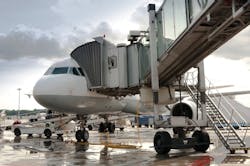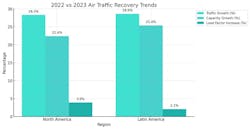Collaboration is Key to Optimizing Ground Support Operations
In the dynamic environment of airport operations, collaboration among ground management teams—responsible for a vast array of activities from baggage handling to catering—serves as a critical asset.
These teams, often stationed across various terminals, gates or security checkpoints, face the challenge of decentralized operations, which can complicate the flow of real-time communication. Despite the intricate 24/7 shift schedules that may not always align, these conditions underscore a valuable opportunity for enhancing cooperative efforts.
Frontline managers at both regional and major hubs play a pivotal role in navigating these complexities. Their ability to orchestrate operations amidst a diverse network of stakeholders—including airlines, ground handlers, security agencies and concessionaires—highlights the profound potential for optimizing operational efficiency through improved collaboration. Each group brings unique priorities and communication styles to the table, yet their interdependence is a fundamental aspect of successfully meeting the critical timelines for in and outbound activities.
Enhanced collaboration across teams can significantly improve operational efficiency, enriching safety and the overall airport experience.
Embracing New Technology Solutions
Rebounding from the air travel slowdown caused by COVID-19, air traffic has gained significant traction worldwide. And that momentum is expected to continue. According to the International Air Travel Association (IATA), North American carriers reported a 28.3 percent annual traffic rise in 2023 compared to 2022. Capacity increased 22.4 percent, and load factor climbed 3.9 percentage points to 84.6 percent. December 2023 traffic rose 13.5 percent compared to the 2022 period.
Similarly, Latin American airlines posted a 28.6 percent traffic rise in 2023 over the full year 2022. Annual capacity climbed 25.4 percent and load factor increased 2.1 percentage points to 84.7 percent, the highest among the regions. December 2023 demand climbed 26.5 percent compared to December 2022.
While this is great news for the industry overall, it puts even more pressure on airline and airport operators to seek solutions to improve ground handling productivity and efficiencies, as well as meeting sustainability goals. Embracing digitalization with new technologies that support process improvements provide the solution. This is where AI-based software can help tremendously, particularly when it can be applied to empowering frontline managers whose role is vital to ensuring communication and collaboration among disparate ground handling teams.
Providing these managers with real-time information, rather than having to rely on a central allocation system, becomes the focal point for relaying critical information to all relevant teams. Armed with mobile devices and AI-based software, the frontline manager can have a central overview of all flights, tasks and resources in their assigned area. For example, instant messaging or shared dashboards keep everyone informed about flight changes, delays, and gate assignments. It also helps to create clear protocols for communication between teams and with airlines to ensure everyone is up-to-date and concurs on activities and schedules.
In other words, ground operation management is a collaborative effort – a team sport, so to speak – and the frontline manager, armed with the right tools has a central overview of all flights, tasks, resources, has the ability to leverage their expertise to balance the workforce across the operation and adjust where necessary. By prioritizing clear communication and collaboration, airport managers can create a more efficient, safe and passenger-friendly environment.
Empowering the Frontline Managers with AI
Airport frontline managers, whether at regional airports or major hubs, face many similar challenges, but the scale and specific details can differ. However, both often operate in a decentralized manner, sharing similar challenges such as flight cancellations, delays, weather woes and unexpected events that are par for the course in aviation. Frontline managers need to keep operations smooth, manage passenger frustration and adapt to changing schedules, and they must handle these challenges while maintaining efficient scheduling, training staff and often dealing with staffing shortages.
One of the biggest common challenges for both hubs and regional airports comes in the form of balancing tasks, leading people and maintaining a positive work environment. Managers need to delegate effectively while staying on top of priorities and knowing what those top priorities are as they change often regularly.
With mobile apps powered by AI, frontline managers will be able to make far better decisions, just like allocators at large hubs. If resource conflicts arise, they will not only be provided with all relevant real-time information, but an AI assistant will proactively propose a number of alternative suggestions on how to resolve the conflict. The managers can still leverage their full expertise and make the final crucial decisions. This support from AI and optimization in combination with human experience and leadership results in a more efficient use of available resources. Taking soft factors such as individual strengths and preferences of each team member into account, leads to even higher efficiency and greater job satisfaction.
Regional Airports – A Local Economic Driver
While regional airports may have fewer terminals and gates compared to major hubs and typically cater to short- and medium-range flights, the term "regional" is more about the airport's role in the larger air transportation network than its size. Regional airports are often a significant monetary driver for their local community and a positive contributor to the economic well-being of their related hubs.
Regional airports act as feeders, funneling passengers to major hubs. This increases passenger volume at the hub, allowing airlines to offer a wider range of destinations and potentially lower fares due to economies of scale. This increased connectivity attracts more business travelers and tourists to the hub city, boosting the local economy.
Additionally, regional airports can support businesses located in the hub city. Businesses can leverage the regional airport to reach new markets and clients in other regions through easier travel options. Regional airports often help distribute the economic benefits of aviation beyond the hub city. Businesses located near the regional airport can benefit from increased passenger traffic and potentially attract investment due to improved accessibility. This can lead to job creation and economic growth in the surrounding region.
However, they do come with a different set of challenges than the major hubs typically experience. Regional airports often have smaller teams and tighter budgets, forcing managers to wear many hats, covering tasks that might be spread across multiple positions at a major hub. Also, since they often have fewer flights and more variation in flight times, it can be more difficult to anticipate workloads and staffing needs. While dealing with large irate crowds tends to be less common at regional airports, managers still need to handle upset passengers caused by delays or cancellations.
AI-based software support systems can alleviate many of these challenges for regional airports and hubs. For instance, such a system can manage operations to ensure efficient passenger flow. There is definitely more complexity involved in managing larger operations. For instance, multiple airlines, terminals and security checkpoints add layers of communication challenges in managing operations at a major hub. Managers need strong collaborative and coordination skills. Large airports tend to attract more attention, so managers need to be especially focused on safety, security and customer service to maintain a positive reputation.
Overall, airport frontline managers play a vital role in keeping operations running smoothly. While the specific challenges may differ between regional and major airports, both require strong leadership, adaptability and the ability to manage people and processes effectively under pressure.
About the Author

Michael Reinkober
Product Manager GS RealTime Staff and Equipment at INFORM GmbH
Michael Reinkober is Product Manager GS RealTime Staff and Equipment at INFORM GmbH, a leading global provider of intelligent optimization solutions for airlines, airports and ground handlers.

